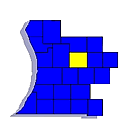The web Browser you are currently using is unsupported, and some features of this site may not work as intended. Please update to a modern browser such as Chrome, Firefox or Edge to experience all features Michigan.gov has to offer.
Richard A. Handlon Correctional Facility (MTU)
Richard A. Handlon Correctional Facility (MTU)
Ionia County
Warden Mindy Braman
1728 W. Bluewater Highway
Ionia, MI 48846
Directions (Bing Maps)

General questions and visiting applications: mdoc-handlon-public@michigan.gov
Telephone: 616-527-3100
Open: 1958
Gender/Age Limit: Males, 18 and older
Security Level: II
General
The Richard A. Handlon Correctional Facility was named after the prison’s first warden. The philosophy of MTU is that a prisoner who has completed the GED and learned a marketable skill has a much better chance of becoming a contributing member of society. MTU houses prisoners who have been placed in the following programs:
- Adaptive Skills Residential Program (ASRP): This program is for prisoners who have significant limitations in adaptive functioning due to a developmental disability or chronic bran disorder.
- Residential Treatment Program (RTP): This program is for prisoners with a mental illness whose health needs cannot be managed in a general population setting. These prisoners require medication, group/individual treatment for symptom management and improvement.
Programming
MTU’s program emphasis includes programming to modify self-destructive behaviors and replace them with goal-directed, positive thought processes.
Vocational Education (Vocational Village): A first-of-its-kind skilled trades training program that aims to provide a positive learning community for prisoners who are serious about completing career and technical education.
Beyond training the prisoners in demand-driven trades, staff at the facility work with employers and community partners to actively assist graduates of the Vocational Village program in their employment goals. Many graduates of this program have employment arrangements prior to leaving the facility on parole.
Supplement Programs: Supplement programs are available to teach job skills, health education and independent living skills. These programs are aimed assisting prisoner workers in meeting community standards in an ongoing part of routine work assignments.
Recreation and Leisure Time Programs: These programs are offered to assist in team building skills.
Religious Services: Services serve all recognized religious groups.
The Richard A. Handlon Correctional Facility hosts the Calvin Prison Initiative (CPI), which is a partnership between Calvin University and Calvin Theological Seminary that has brought opportunities for higher education to those that are incarcerated for over a decade. CPI students can earn certificates in Liberal Ars and Sciences, as well as Faith and Community Leadership. Students ultimately receive Associate and Bachelor of Arts Degrees in Faith and Community Leadership and Human Services.
Healthcare
Prisoners are provided on-site medical, mental health and dental care. Emergencies are referred to a local hospital and more serious problems are treated at the MDOC’s Duane L. Waters Health Center in Jackson.
Security
A double chain-link fence, concertina wire and electronic detection system make up the perimeter security.
